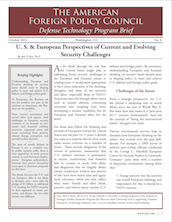On July 18, AFPC's Director of Defense Technology Programs, Rich Harrison, hosted a luncheon on "The Future of European Security: European vs. American Perspectives" for Congressional staff members at the U.S. Capitol Visitors Center. The featured speaker, Gen. John Rose (U.S. Army, Ret.), currently serves as a Visiting Professor at Missouri State University’s Defense and Strategic Studies Graduate Program and Vice-President-Consultant for Strategic Planning at Veterans Enterprise Technology Solutions, Inc. Previously, He served as Director at the George C. Marshall European Center for Security Studies in Garmisch-Partenkirchen, Germany.
In his remarks, Gen. Rose questioned whether Americans and their European NATO allies felt equally strong about issues such as missile defense, countering terrorism and stopping Iran from developing a nuclear capability. He discussed the results of various international surveys that tracked how European thinking on strategic threats has evolved over the past half-decade.
From these assessments and several other such reports, chief challenges to European security continue to be focused on economic and financial stability, terrorism, organized crime and issues stemming from poverty, climate change, corruption, and natural/nuclear disasters. Yet there are three other contemporary challenges that remain relevant to the trans-Atlantic relationship. Namely the threat posed by a resurgent Russia, the decisive cuts to the defense budget, and the necessary role of missile defense in the European theatre.
Gen. Rose concluded that the divide between the U.S. and our European allies is not likely to dissipate soon—even with the pledge of $1 billion in additional U.S. funding for NATO security. In their approach to issues, priorities, and threats, the two sides remain very different. Greater common ground is not likely, at least in the near term. While we may share a “strategic culture” in terms of common values and truths, the ways and means to employed by the U.S. and Europe to achieve defense and foreign policy goals remain worlds apart.
To access the full report based on the speakers comments, please read the downloadable file below.

